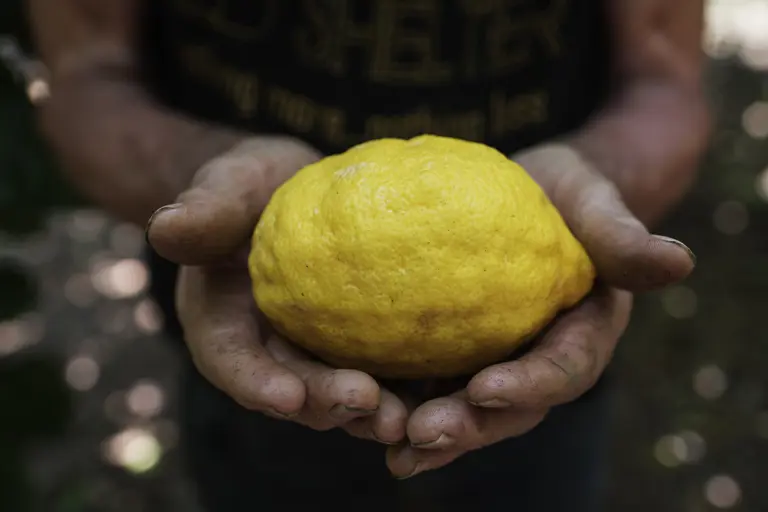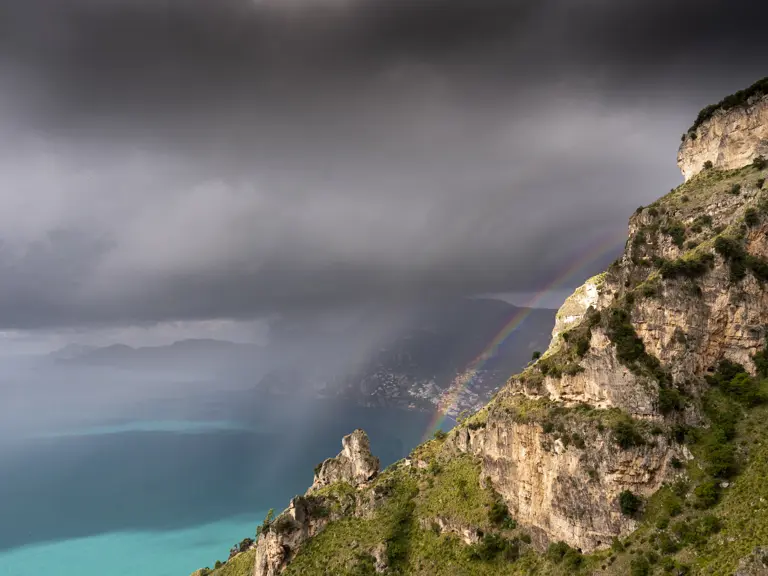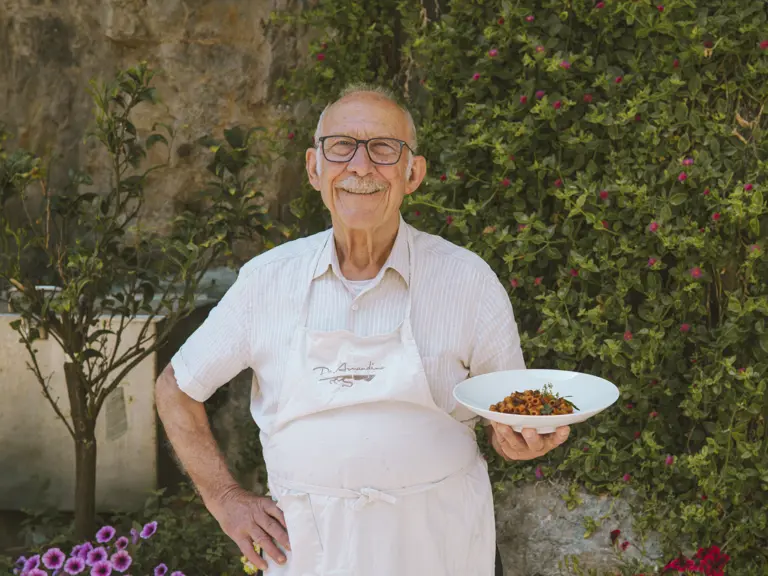WHEN LIFE GIVES YOU LEMONS...
05.01.2023 BEST OF THE COAST
In the episode of his Italian food odyssey Searching for Italy that was dedicated to Naples and its surrounding area, actor and gastronome Stanley Tucci went so far as to call this variety, which is found only here on the Costiera, “the best lemon in the world”.
Salvatore Aceto, who has dedicated his life to growing, safeguarding and promoting the sfusato Amalfitano lemons he and his father Giggino grow on their family farm in Amalfi, is more cautious. “The sfusato is certainly one of the best”, he agrees, as Giggino, now well into his eighties, invites me to inhale the scent of a basket of lemons he has just picked. The fragrance is delicate but unmistakeable: fresh, tangy, zesty, with a hint of sherbert and a whisper of lime.
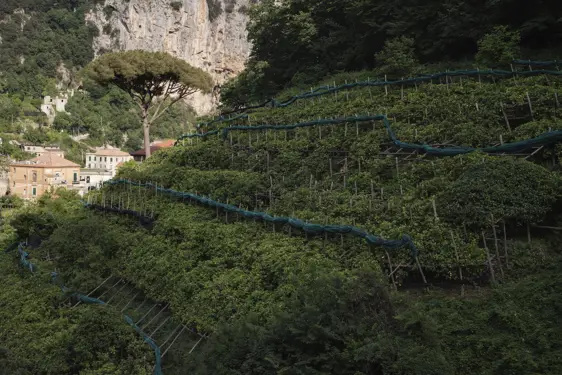
View
The Aceto lemon farm occupies a series of steep, walled terraces in the Valle dei Mulini, the landward extension of Amalfi town that was famous for its paper mills, fed by a fast-flowing stream that tumbled down from the lofty Monti Lattari. The Aceto family – whose surname, ironically, translates as ‘vinegar’ – have been growing lemons on the Coast since 1825, first in Ravello and later in Amalfi.
Salvatore is the seventh generation of the family to tend lemons here. He initially trained as an accountant and for many years ran a successful office in town, but papà Giggino never stopped reminding him that the family’s true métier was lemons – and so, in 2013, Salvatore gave in, joined the firm, and set about making the business sustainable, in both senses of the word. The farm became entirely organic, and opened up to tourism – without which, Salvatore freely admits, it would be difficult to make a living out of lemons in 21st century Amalfi. A series of lemon tours and cooking classes can be booked via the farm’s website, including some that take in the family’s other agricultural activity – beekeeping and honey production.
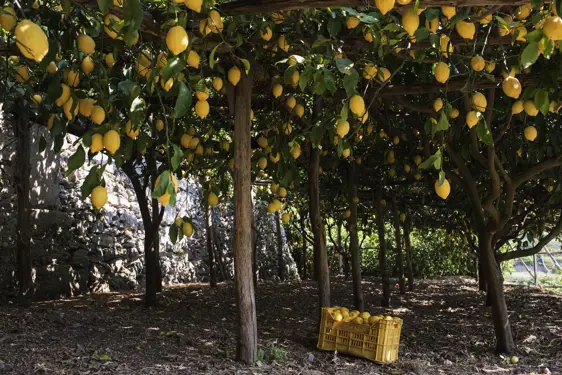
View
The ancient dry-stone walls of the Aceto farm and many of the other surviving lemon groves of the Costiera are known locally as macerine. Some date back almost a thousand years. Today, they are recognized to play an important role in preventing soil erosion, landslides and flash floods. In among the terraces, a centuries-old system of stone water tanks and channels capture precious rainwater in the colder months that keeps the thirsty trees healthy in the arid summer season.
Between November and April, the trees are protected from frosts by netting draped over chestnut poles called pertiche which were traditionaly cut and dressed in woods high up on the slopes of the Monti Lattari. In every farm, you’ll always find at least one worker – often a young, slender lad – who specializes in walking along the pertiche or leaping from one level to another like an acrobat in order to lay the nets, to pick the highest lemons or to prune the trees. They’re known as contadini volanti or ‘flying famers’. However, even at his advanced age, Giggino is not above some acrobatics himself, as the photo below demonstrates.
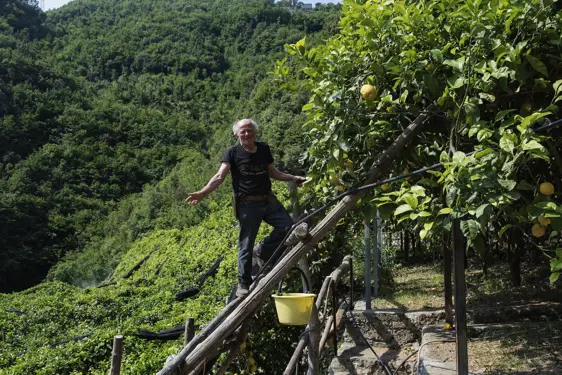
View
Picking the lemons was once women’s work, but today it’s mostly done by men. Before the war, Salvatore tells us, overseers would even check that the female workers had trimmed their fingernails, as the slightest scratch on the surface of a lemon meant it would keep only a couple of weeks rather than several months. The baskets of lemons can weigh anything between 25 and 50kg (55-110lbs) and are transported by hand. Aceto was one of the first growers to install a zip line in the 1970s to ferry lemon boxes down to the storage facility, but those boxes still need to be hauled to its top station by the muscular pickers. “Why not use donkeys?”, we ask. “Sure, we have a few”, Salvatore replies with a smile, “but the donkeys we use most are these” – and he slaps his muscular thighs.
The farm currently grows both sfusato amalfitano lemons and a Sicilian variety called zagara bianca, both of which are harvested mainly in winter (right now, in January, is peak lemon season). But Salvatore is keen to gradually replace the zagara trees with sfusato lemons, which he says, “are less juicy, but of far higher quality”. In her book on Italy’s long tradition of citrus cultivation, The Land Where Lemons Grow, British writer Helena Attlee provides a neat summary of what makes the sfusato amalfitano special. “It’s a large lemon”, she writes, “with juicy flesh and thick skin full of highly perfumed essential oils. Inside, there are never more than nine segments and very few seeds”. The sfusato is one of the few lemons that can be eaten raw – because, as Attlee explains, “the juice has very low acidity… you wouldn’t expect it to give a kick to a home-made mayonnaise, and you can’t use it to replace the vinegar in a salad dressing because it is altogether too gentle for jobs like that. Instead… in Amalfi, a slice of lemon sprinkled with ground coffee and sugar serves as a simple digestivo after a meal”.
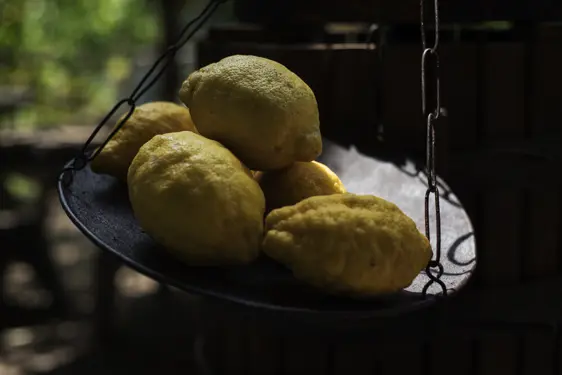
View
Rich in vitamins, potassium and magnesium, sfusato lemons are considered panaceas for all sort is maladies in their home territory. “A strip of lemon peel in an espresso is guaranteed to get rid of a headache or a hangover”, Salvatore tells us, “and there’s nothing better for an ailing child than the pulp and skin of a sfusato lemon mixed with a little parsley and garlic”. They are even, he points out, natural skincare products. “Look at how soft they are”, he tells us, holding out his hands. “That’s because of all the lemon oil they’ve absorbed over the years”.
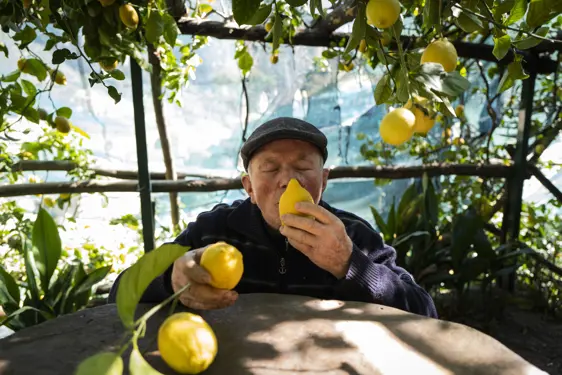
View
Papà Giggino has lived his whole life around lemons. Seated beneath one of his beloved lemon trees as our photographer Robero filmed him, the octogenarian told the Sirenuse Journal that “Lemons are my one true love. I have them in my veins, where lemon juice runs instead of blood. I was even conceived under a lemon tree! I’m the eighth of thirteen children, and we all lived in a tiny little house. My parents couldn’t be together inside, so when they wanted to make love, they were forced to go outside, into the lemon groves. I’m sure that explains my love for lemons!”
Photos © Roberto Salomone
Le Sirenuse Newsletter
Stay up to date
Sign up to our newsletter for regular updates on Amalfi Coast stories, events, recipes and glorious sunsets
